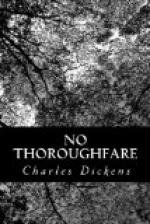The once familiar aspect of the building was altered to him, as the look of the portrait over the chimney-piece was altered to him. His one dearest association with the place which had sheltered his childhood had been broken away from it for ever. A strange reluctance possessed him, when he stated his business at the door. His heart ached as he sat alone in the waiting-room while the Treasurer of the institution was being sent for to see him. When the interview began, it was only by a painful effort that he could compose himself sufficiently to mention the nature of his errand.
The Treasurer listened with a face which promised all needful attention, and promised nothing more.
“We are obliged to be cautious,” he said, when it came to his turn to speak, “about all inquiries which are made by strangers.”
“You can hardly consider me a stranger,” answered Wilding, simply. “I was one of your poor lost children here, in the bygone time.”
The Treasurer politely rejoined that this circumstance inspired him with a special interest in his visitor. But he pressed, nevertheless for that visitor’s motive in making his inquiry. Without further preface, Wilding told him his motive, suppressing nothing. The Treasurer rose, and led the way into the room in which the registers of the institution were kept. “All the information which our books can give is heartily at your service,” he said. “After the time that has elapsed, I am afraid it is the only information we have to offer you.”
The books were consulted, and the entry was found expressed as follows:
“3d March, 1836. Adopted, and removed from the Foundling Hospital, a male infant, named Walter Wilding. Name and condition of the person adopting the child—Mrs. Jane Ann Miller, widow. Address—Lime-Tree Lodge, Groombridge Wells. References—the Reverend John Harker, Groombridge Wells; and Messrs. Giles, Jeremie, and Giles, bankers, Lombard Street.”
“Is that all?” asked the wine-merchant. “Had you no after-communication with Mrs. Miller?”
“None—or some reference to it must have appeared in this book.”
“May I take a copy of the entry?”
“Certainly! You are a little agitated. Let me make a copy for you.”
“My only chance, I suppose,” said Wilding, looking sadly at the copy, “is to inquire at Mrs. Miller’s residence, and to try if her references can help me?”
“That is the only chance I see at present,” answered the Treasurer. “I heartily wish I could have been of some further assistance to you.”
With those farewell words to comfort him Wilding set forth on the journey of investigation which began from the Foundling doors. The first stage to make for, was plainly the house of business of the bankers in Lombard Street. Two of the partners in the firm were inaccessible to chance-visitors when he asked for them. The third, after raising certain inevitable difficulties, consented to let a clerk examine the ledger marked with the initial letter “M.” The account of Mrs. Miller, widow, of Groombridge Wells, was found. Two long lines, in faded ink, were drawn across it; and at the bottom of the page there appeared this note: “Account closed, September 30th, 1837.”




